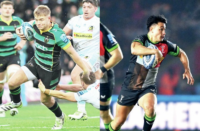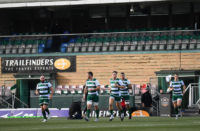 The news that Steve McNamara is staying at his post in Rugby League – part time with England and assistant coach at Sydney Roosters – strikes me as a blessing for Bath, and also for aspiring Rugby Union coaches. Reports last week suggested that McNamara was being lined up to join Bath at the same time as Gary Gold was heading for the exit in another controversial reshuffle at The Rec.
The news that Steve McNamara is staying at his post in Rugby League – part time with England and assistant coach at Sydney Roosters – strikes me as a blessing for Bath, and also for aspiring Rugby Union coaches. Reports last week suggested that McNamara was being lined up to join Bath at the same time as Gary Gold was heading for the exit in another controversial reshuffle at The Rec.
I have nothing against McNamara, who is clearly a solid Rugby League coach, but it is hard to see exactly what the benefits of having another crossover coach at Bath would be, especially as head coach Mike Ford is steeped in the 13-man code as a former Great Britain scrum-half.
If there are significant developments in Rugby League that can be transferred to Rugby Union, then Ford is eminently qualified to ensure the Bath squad gains from them.
For the record, the one area where League players are superior to their Union counterparts in the pro era is in the quality of their passing and understanding of overlaps. The passing in League is crisper and more accurate, while overlaps are rarely squandered – as they are by Union backs – by long cut-out passes which kill a numerical advantage stone dead.
However, these are skills which any decent coach, let alone one with the credentials of a former England coach like Ford, should be good at teaching. Good passing is not quantum physics, and it does not require Rugby League coaches to be imported into Rugby Union to teach it.
It is time that the transfer of coaching skills from the 13-man code to Rugby Union was demystified.
There is little doubt that there have been significant benefits from former Rugby League stars of the calibre of Shaun Edwards and Andy Farrell coming into the Union game in England, with the Aussie, Les Kiss, doing the same in Ireland.
 Edwards is a clever coach whose track record with Wasps (two Heineken Cups and multiple Premiership titles) and the Wales (two Grand Slams) speaks for itself. He famously came up with an adaptation of the blitz defence which saw Wasps punish turnovers ruthlessly, creating a prototype in the Dallaglio era of what New Zealand are doing now.
Edwards is a clever coach whose track record with Wasps (two Heineken Cups and multiple Premiership titles) and the Wales (two Grand Slams) speaks for itself. He famously came up with an adaptation of the blitz defence which saw Wasps punish turnovers ruthlessly, creating a prototype in the Dallaglio era of what New Zealand are doing now.
Kiss was also innovative, developing the choke tackle which Ireland employed so effectively to win turnovers at the 2011 World Cup, and beyond.
Farrell is known for his strength of character and motivational qualities in raising standards at Saracens, and in the England camp during Stuart Lancaster's tenure, while also helping to drive the Lions to a series victory in Australia last summer.
However, these are three exceptions, in the same way that Phil Larder was as Sir Clive Woodward's 2003 World Cup winning defence coach, and John Muggleton was as defence coach for the 1999 World champion Wallaby side.
What they do not do is establish a rule that anyone with a Rugby League background has a wand that will bestow magic on any Union team they coach .
The Great Britain and England records in Rugby League over the past 40 years are nothing to shout about. It is also valid as a measure of coaching success – or lack of it.
In the last two Rugby League World Cups, which are essentially three-horse races between Australia, New Zealand and England, it is England who finished third on both occasions. However, by far the most damning statistic for the 13-man code in this part of the world has been the failure of Great Britain to win a Test series against Australia since 1970.
The reality is that because Rugby Union has had an increasing resemblance to Rugby League in the last decade due to IRB law changes – specifically in allowing rucks to become static – a handful of Rugby League coaches have brought their knowledge of flat-line defences to bear.
That knowledge can be applied to how to build them, and how to break them. The problem is that it is far easier to build a flat-line defence in Union than it is to find ways of breaking it – and, thus far, former Rugby League coaches are finding it as vexing as anyone.
For instance, Farrell had a frustrating autumn as England backs coach. There was very little cohesion or strike power on show, and the slick passing an appreciation of time and space evident in the back-play of New Zealand, Australia, and even South Africa, was also in short supply.
Interestingly, under Gold, who was South Africa's forwards coach during the victory over the 2009 Lions, the Springboks found a way of disrupting flat-line defences. They did it by constructing the best driving lineout in the game, with Gold using Victor Matfield's lineout supremacy to full advantage.
A driving maul has to be defended, and the only way to do that is to throw enough bodies into contact to slow it down. That, in turn, leaves gaps for the attacking side's backs to exploit.
The last time I looked there were not any driving mauls in Rugby League.
What Gold's departure from Bath tells us is that Rugby Union should value its own coaching legacy much more highly.


























